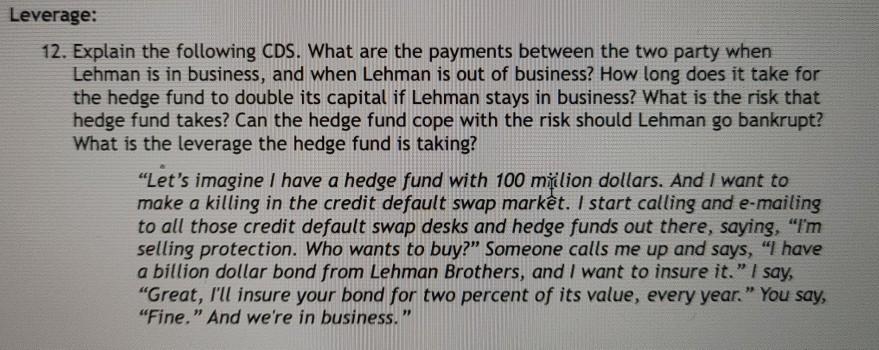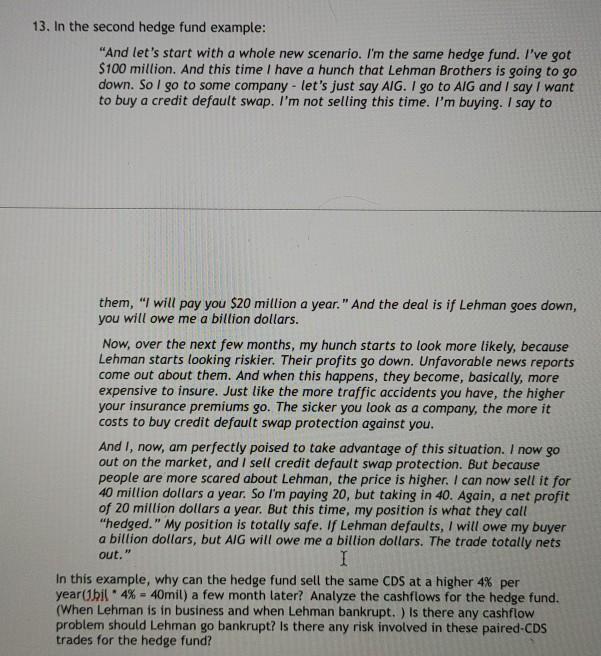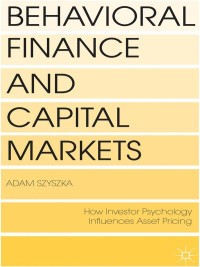Answered step by step
Verified Expert Solution
Question
1 Approved Answer
Leverage: 12. Explain the following CDS. What are the payments between the two party when Lehman is in business, and when Lehman is out of


Leverage: 12. Explain the following CDS. What are the payments between the two party when Lehman is in business, and when Lehman is out of business? How long does it take for the hedge fund to double its capital if Lehman stays in business? What is the risk that hedge fund takes? Can the hedge fund cope with the risk should Lehman go bankrupt? What is the leverage the hedge fund is taking? "Let's imagine I have a hedge fund with 100 milion dollars. And I want to make a killing in the credit default swap market. I start calling and e-mailing to all those credit default swap desks and hedge funds out there, saying, "I'm selling protection. Who wants to buy?" Someone calls me up and says, "I have a billion dollar bond from Lehman Brothers, and I want to insure it." I say, "Great, I'll insure your bond for two percent of its value, every year." You say, "Fine." And we're in business. 13. In the second hedge fund example: "And let's start with a whole new scenario. I'm the same hedge fund. I've got $100 million. And this time I have a hunch that Lehman Brothers is going to go down. So I go to some company - let's just say AIG. I go to AIG and I say I want to buy a credit default swap. I'm not selling this time. I'm buying. I say to them, "I will pay you $20 million a year." And the deal is if Lehman goes down, you will owe me a billion dollars. Now, over the next few months, my hunch starts to look more likely, because Lehman starts looking riskier. Their profits go down. Unfavorable news reports come out about them. And when this happens, they become, basically, more expensive to insure. Just like the more traffic accidents you have, the higher your insurance premiums go. The sicker you look as a company, the more it costs to buy credit default swap protection against you. And I, now, am perfectly poised to take advantage of this situation. I now go out on the market, and I sell credit default swap protection. But because people are more scared about Lehman, the price is higher. I can now sell it for 40 million dollars a year. So I'm paying 20, but taking in 40. Again, a net profit of 20 million dollars a year. But this time, my position is what they call "hedged." My position is totally safe. If Lehman defaults, I will owe my buyer a billion dollars, but AIG will owe me a billion dollars. The trade totally nets out." I In this example, why can the hedge fund sell the same CDS at a higher 4% per year(hil 4% - 40mil) a few month later? Analyze the cashflows for the hedge fund. (When Lehman is in business and when Lehman bankrupt.) Is there any cashflow problem should Lehman go bankrupt? Is there any risk involved in these paired-CDS trades for the hedge fund? Leverage: 12. Explain the following CDS. What are the payments between the two party when Lehman is in business, and when Lehman is out of business? How long does it take for the hedge fund to double its capital if Lehman stays in business? What is the risk that hedge fund takes? Can the hedge fund cope with the risk should Lehman go bankrupt? What is the leverage the hedge fund is taking? "Let's imagine I have a hedge fund with 100 milion dollars. And I want to make a killing in the credit default swap market. I start calling and e-mailing to all those credit default swap desks and hedge funds out there, saying, "I'm selling protection. Who wants to buy?" Someone calls me up and says, "I have a billion dollar bond from Lehman Brothers, and I want to insure it." I say, "Great, I'll insure your bond for two percent of its value, every year." You say, "Fine." And we're in business. 13. In the second hedge fund example: "And let's start with a whole new scenario. I'm the same hedge fund. I've got $100 million. And this time I have a hunch that Lehman Brothers is going to go down. So I go to some company - let's just say AIG. I go to AIG and I say I want to buy a credit default swap. I'm not selling this time. I'm buying. I say to them, "I will pay you $20 million a year." And the deal is if Lehman goes down, you will owe me a billion dollars. Now, over the next few months, my hunch starts to look more likely, because Lehman starts looking riskier. Their profits go down. Unfavorable news reports come out about them. And when this happens, they become, basically, more expensive to insure. Just like the more traffic accidents you have, the higher your insurance premiums go. The sicker you look as a company, the more it costs to buy credit default swap protection against you. And I, now, am perfectly poised to take advantage of this situation. I now go out on the market, and I sell credit default swap protection. But because people are more scared about Lehman, the price is higher. I can now sell it for 40 million dollars a year. So I'm paying 20, but taking in 40. Again, a net profit of 20 million dollars a year. But this time, my position is what they call "hedged." My position is totally safe. If Lehman defaults, I will owe my buyer a billion dollars, but AIG will owe me a billion dollars. The trade totally nets out." I In this example, why can the hedge fund sell the same CDS at a higher 4% per year(hil 4% - 40mil) a few month later? Analyze the cashflows for the hedge fund. (When Lehman is in business and when Lehman bankrupt.) Is there any cashflow problem should Lehman go bankrupt? Is there any risk involved in these paired-CDS trades for the hedge fund
Step by Step Solution
There are 3 Steps involved in it
Step: 1

Get Instant Access to Expert-Tailored Solutions
See step-by-step solutions with expert insights and AI powered tools for academic success
Step: 2

Step: 3

Ace Your Homework with AI
Get the answers you need in no time with our AI-driven, step-by-step assistance
Get Started


